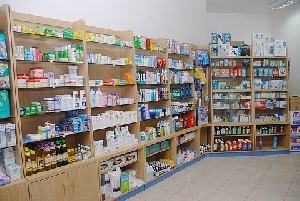Local pharmaceutical manufacturers want the imposition of restrictions on the importation of basic drugs that are being produced in the country, so as to promote the local industry and make the vision of ‘Ghana beyond Aid’ a reality.
Indeed, the impact of COVID-19 on the economy and the realization that the local pharmaceutical industry can fill the void created by border closures due to the outbreak of the pandemic, has suddenly resurrected the needed confidence in the local pharmaceutical industry.
Also, it has been made good by the promise by the Minister of Finance, Ken Ofori Atta, in the Mid-Year Budget Review to give more attention to locally produced goods. After all, that is why the local industry came into being to respond to the pharmaceutical needs of Ghanaians.
The Pharmaceutical Manufacturers Association of Ghana (PMAG) has the capacity to respond to local demands and they needed to be given the opportunity to prove their mettle. Currently, 34 companies produce various forms of pharmaceutical products and drugs in the country.
Executive Secretary of PMAG, Lucia Addae, speaking at the 2020 Ghana Pharma Summit 2020 on the theme ‘COVID-19: The capacity of the pharma industry, what lies ahead’ noted that most pharmaceutical companies in the country are under-utilised despite the heavy investments.
She added that: “We have the capacity to serve the pharmaceutical needs of the nation. We can manufacture up to 70 percent of what we need”. President of the Pharmaceutical Society of Ghana, Ben Botwe, also advocated more attention for the sector as it has huge potential.
Countries like India have been very successful with a similar policy which has empowered its local pharmaceutical industry which is now recognized world-wide as a credible player in the global pharmaceutical industry.
Therefore, we believe the call by PMAG is in the right direction since the outbreak of COVID-19 has compelled us to look inward for some of the solutions to our medical problems.
“What we are saying is that if there is the demand, if there is a buyer – whether government of private – we are saying that this market is available”, the PMAG Executive Secretary stated.
Currently, the local manufacturing industry produces only 30 per cent of the country’s medicinal needs, with a little over GH¢900 million going into importing the medicines. It is high time it improves its share of the local market.
Border closures look to be lifted soon
The Ministry of Aviation says it is sending a comprehensive proposal to the President this week on how it plans to reopen the nation’s air borders.
That would complete the easing of restrictions due to COVID-19 which signals the economy fully bouncing back to life.
President Nana Addo Dankwa Akufo-Addo, in his 14th address to the nation as part of COVID-19 updates, said that it would only happen when the nation is content with control mechanisms to check the importation of cases.
Our aviation correspondent has assured that a number of control mechanisms have been presented in the proposal for government’s consideration. Currently, the Ghana Airport Company Limited (GACL) and the Ghana Civil Aviation Authority (GACL) are facing serious financial challenges as their main source of income has dried up due COVID-19 restrictions.
Government has approved a bailout for the aviation industry, largely dedicated towards maintaining the staff. This is just a stop-gap measure to ensure that the industry does not fall completely on its knees, that is why the submission of the proposal to cabinet is a welcome development.
The GH¢312 million bailout facility would exist for the next six months, we are learning.
As the Yuletide season fast approaches and the impending Presidential and Parliamentary elections in December beckons, it would be appropriate to ease the remaining restrictions to allow economic life to be restored so that a semblance of normalcy is restored.
Therefore, we are quite hopeful that if Cabinet is convinced about the measures put in place to ensure adequate control mechanisms, the green light would be announced in the next Presidential update on the COVID-19 situation.
After all, West African government ministers proposed re-opening borders between their countries in the first half of July, and allowing in travellers from other countries with low or controlled levels of coronavirus spread by the end of July.
We believe therefore that the proposal is in good stead and depending on expert advice, the border restrictions would soon be lifted. This would give people engaged in commerce some respite and enable them to engage in import/export trade without any hindrances.
A third phase, involving the opening of air and land borders to “countries with low and controlled levels of COVID-19 contamination rates”, should occur by July 31 but will depend on the evolution of the pandemic, ECOWAS ministers note.
Click to view details



Business News of Wednesday, 5 August 2020
Source: thebftonline.com







![Deputy Minority Leader, Emmanuel Armah-Kofi Buah [L] and First Lady Rebecca Akufo-Addo Deputy Minority Leader, Emmanuel Armah-Kofi Buah [L] and First Lady Rebecca Akufo-Addo](https://cdn.ghanaweb.com/imagelib/pics/114/11465182.295.jpg)









